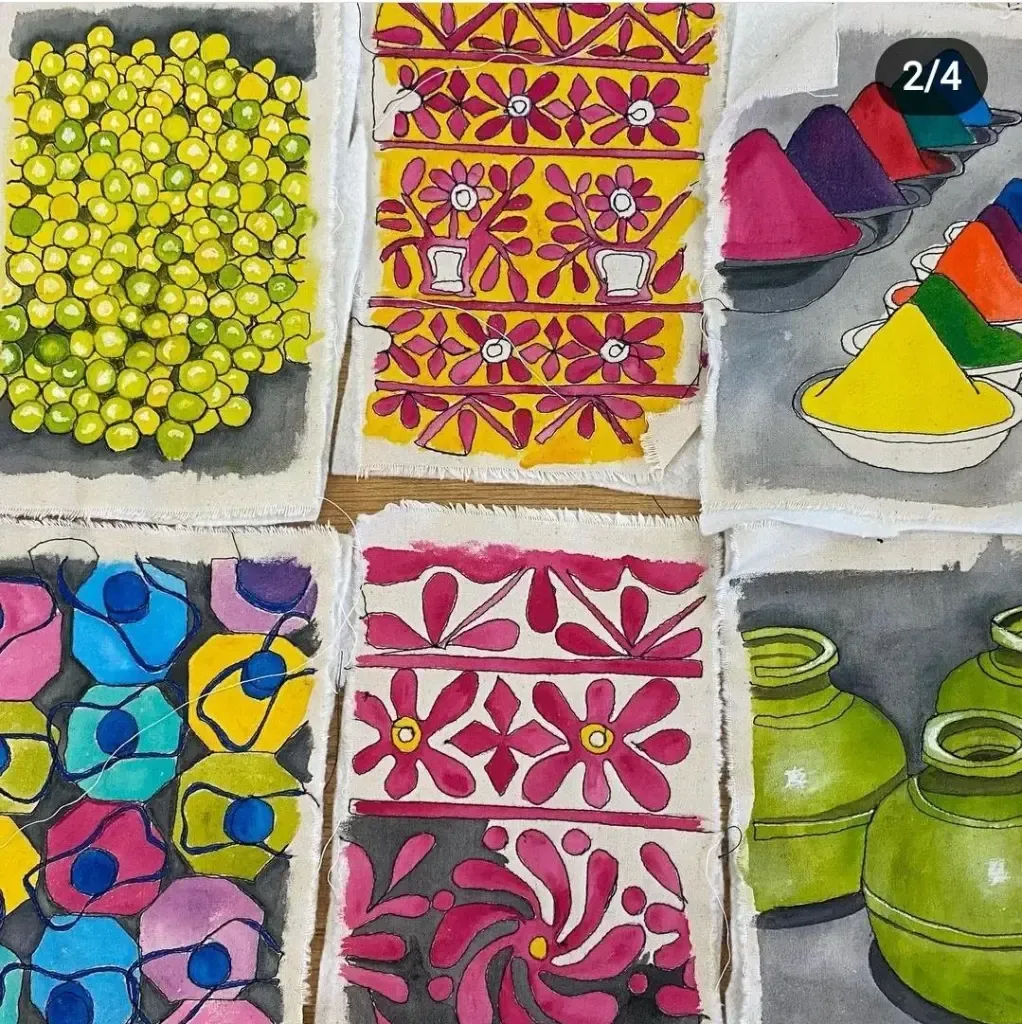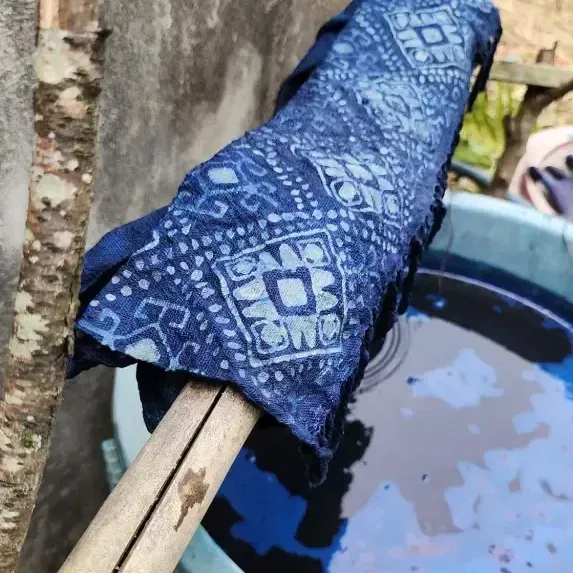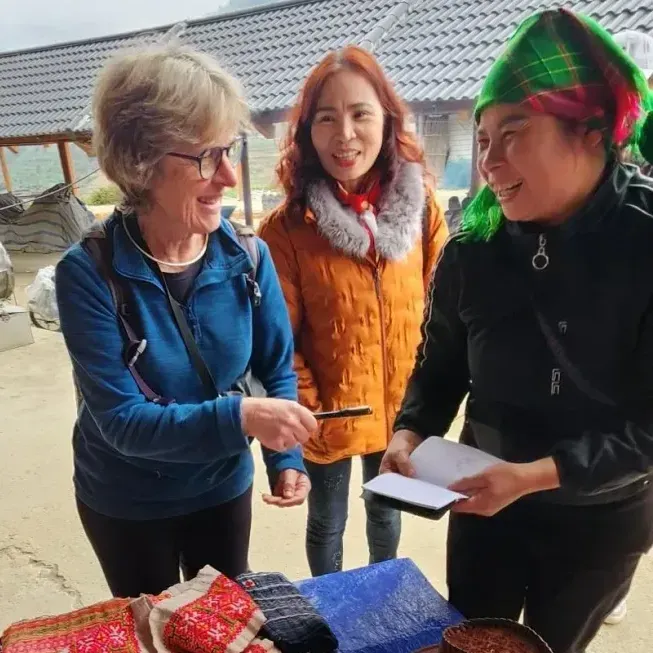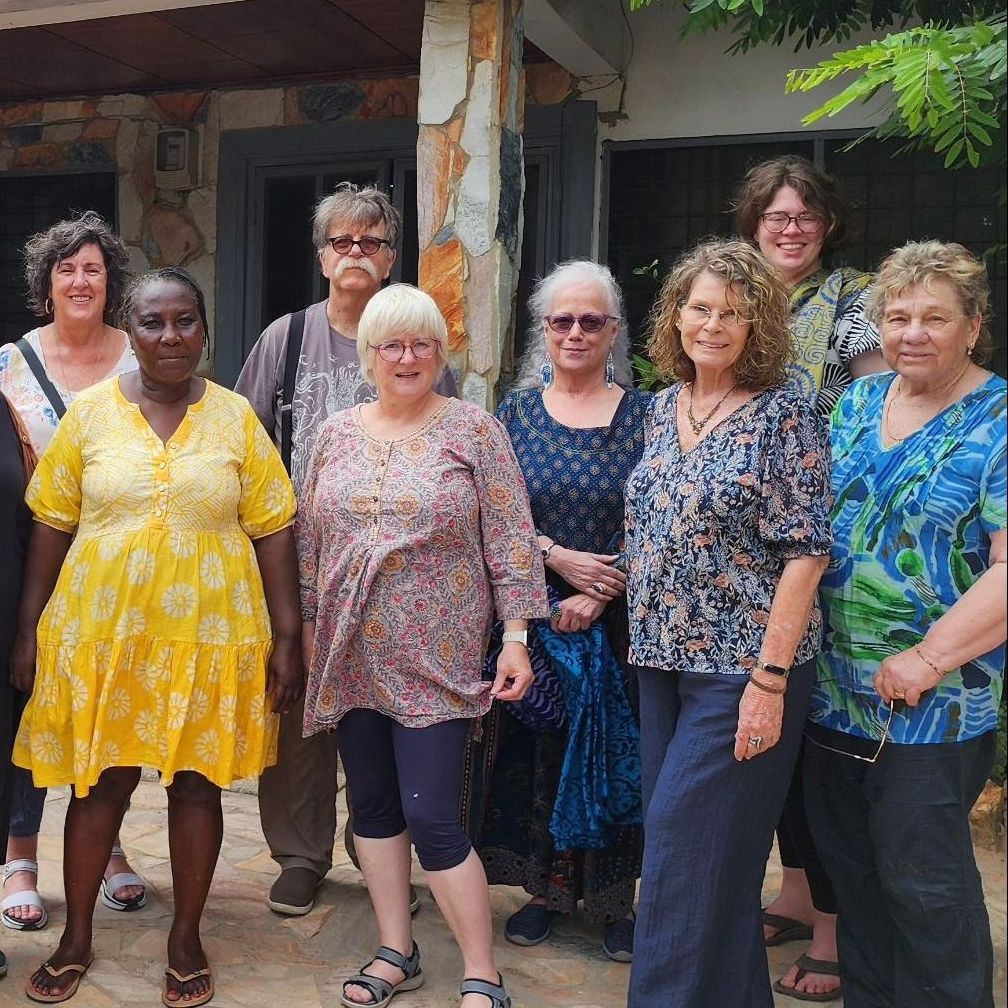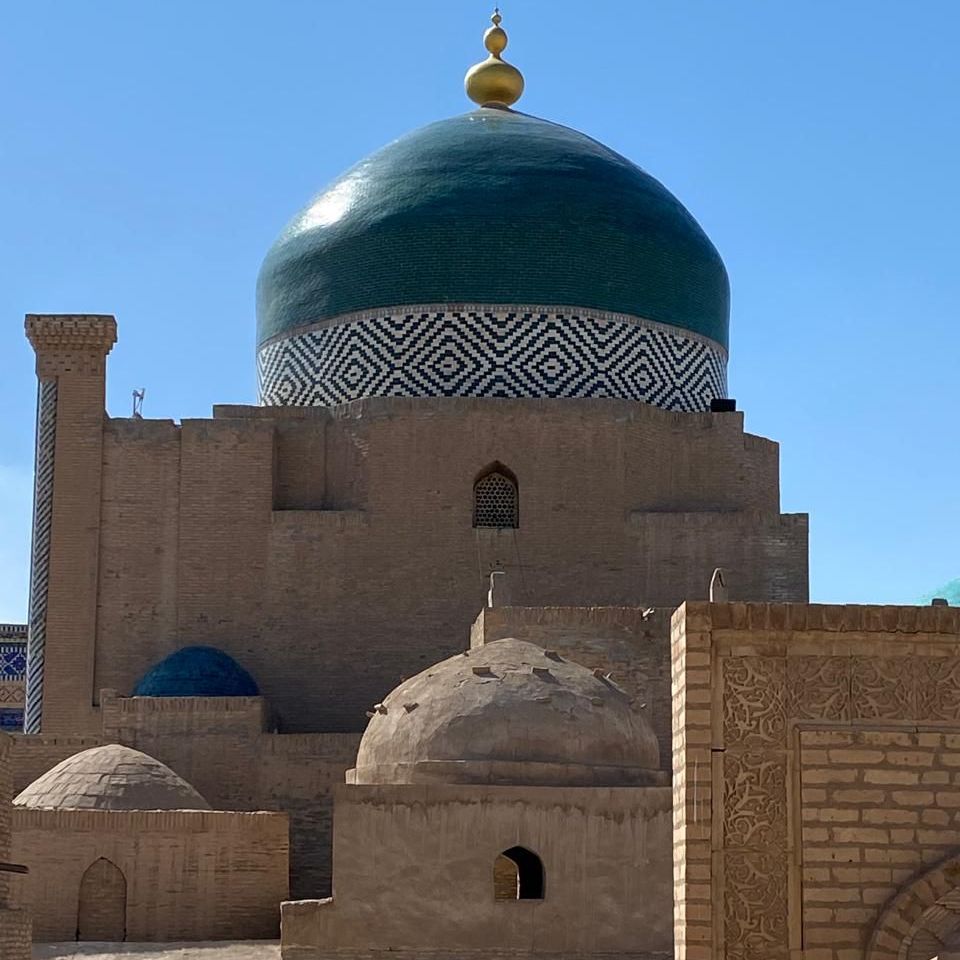Travel Notes
Tips to help you prepare.
Good to cover a few details to help in preparation for your journey.
In General - Dress Code
We don’t like to lay down rules, but I would encourage you to think about what the locals wear where we are going and to respect that level of cover.
Generally, aiming for neck to below knee coverage is a good guideline for most places.
We feel fortunate to receive invitations into people’s homes and workshops.
However, on the street, it’s a whole other situation, where you might attract the kind of attention you’d rather avoid.
Personally, I usually opt for loose long trousers and a sleeveless or cap sleeve tunic, accompanied by a big scarf to cover up if needed. This approach seems to work well in various settings.
Money
- In general Visa and Mastercard are accepted - American Express, Maestro not so often
- Notify your bank you are going OS and to expect activity in the countries you will visit, possibly transit lounges on the way, too. Otherwise they might flag unusual activity and block your card.
- Travel Cards can be good for security of your accounts CHECK before you leave that they actually work. A number of times guests have had issues.
- We use wise.com ourselves, and have been very happy with it.
- GOOD to have a backup card or two hidden in your suitcase, so that if primary card/s don’t work or get lost you have a fall-back card.
- ATM– easy to get cash KNOW YOUR PIN– Tap is not everywhere.
- Cash to exchange- good back up but not always easy to exchange at a good rate. Ask at hotel front desk.
- Credit Cards in the developing world few places have the facilities to process credit card transactions Credit Cards expect an additional fee to cover high processing fees of developing world banks. Not always but it happens.
Environment
Step lightly on our environment, be frugal in water use, turn off power switches, take rubbish with you where possible.
Say NO to Plastic!
Please bring a cloth carry bag.
India
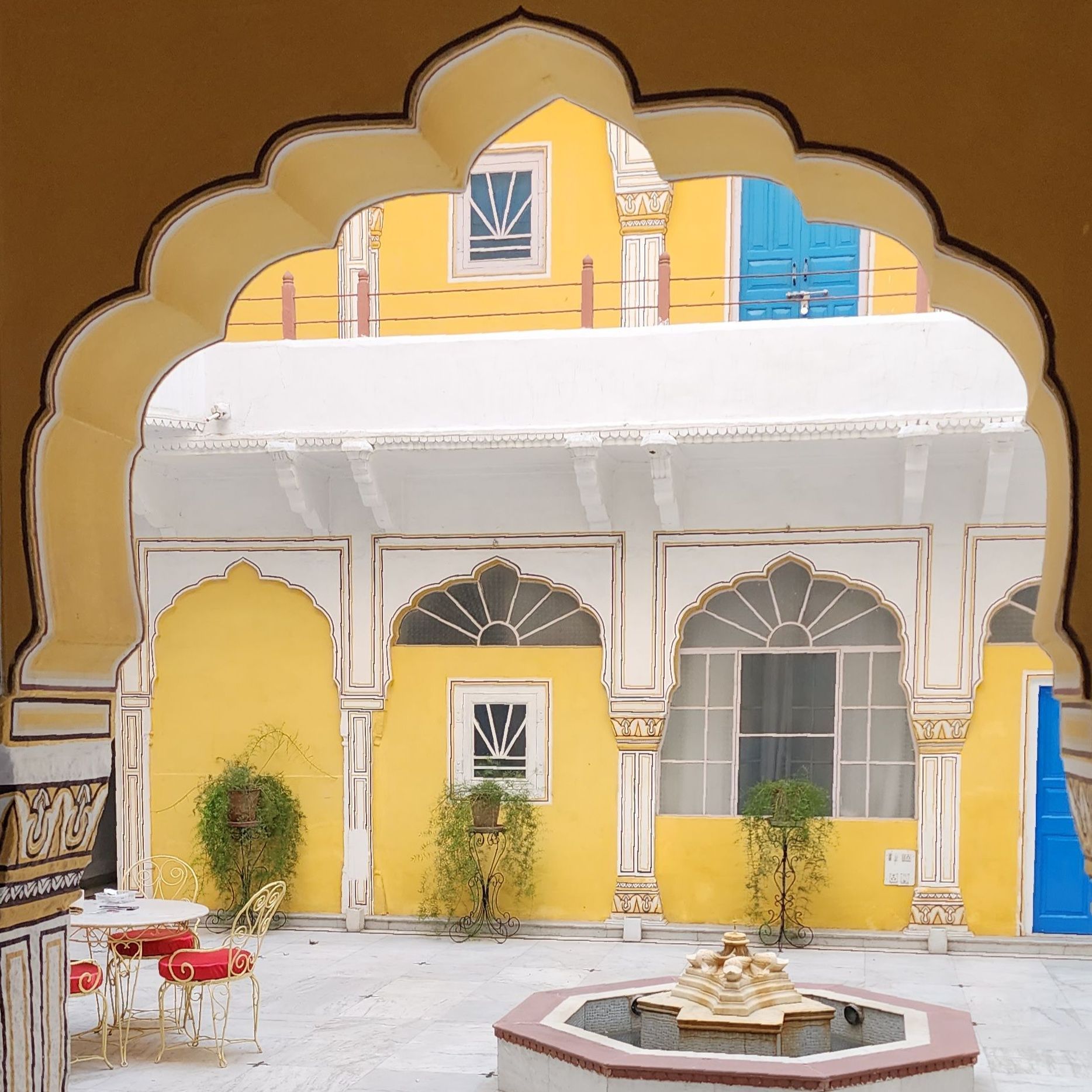
Etiquette
- Be sensitive of people's privacy taking photos in temples, ghats etc
- Taking photos of people - how would you feel with a camera poked into your face? BUT Indian people love a good selfie- so say hello, ask for a selfie, show them and then ask for a photo of them - works a charm.
- Try and pick up a few curtesies in the language of the place you are visiting- it is always appreciated
India is vast, regions are very different and we run a number of tours so you can experience the differences.
Blog Take a look– I’ve talked about India and her various regions a lot over the years.
Workshops Apron might be an idea for Blockprinting and indigo
Food Food is an integral part of culture and we are there to try it all. Generally, with group meals we choose a range of dishes to share and look for local specialties as we go.
In India they cook from scratch using fresh ingredients so keeping track of what goes into your dinner is easy enough. Products like soy milk, manufactured substitute proteins, etc not seen.
Vegetarian? Easy in India
Vegan- little more challenging but possible in India
Chilli free, India not possible, it is like saying don’t breathe to Indian cooks. We can definitely order mild, only a hint of spice.
Onion, garlic free- a challenge to manage
Wheat free- easy in India.
Health Drink only filtered or bottled water- never local supply, even for cleaning your teeth
Check yourself- Drink at least 2 litres of WATER per day. You will feel better for it and less likely to have a funny tummy.
See your Doctor or a Travel Specialist Doctor before you leave home for travel advice
Bring adequate medical supplies to cover your needs and the prescription to verify their use
Menstrual needs- tampons not easy to find. Pads available
Bug spray
Money
KNOW YOUR CARD PIN!!
ATMs everywhere. easy to withdraw funds. BUT you need to know your PIN. TAP is not allowed.
Notify your bank you are going OS and to expect activity in which ever country, possibly transit lounges on the way, too. Otherwise they might flag unusual activity and block your card.
Travel Cards can be good for security of your accounts CHECK before you leave that they actually work. A number of times guests have had issues. www.wise.com cards seem to work well too- a few guests have had them recently.
GOOD to have a backup card hidden in your suitcase, so that if primary card/s don’t work or get lost you have a fall-back card.
ATM– easy to get cash
Cash to exchange- good back up but not always easy to exchange at a good rate. Ask at hotel front desk.
Credit Cards in the developing world few places have the facilities to process credit card transactions
Credit Cards expect an additional fee to cover high processing fees of developing world banks. Not always but it happens
Currency - Indian Rupee
Shopping It happens, there are treasures to find 😊 It helps the local economy.
If there are things you know you might want, for example carpets or spices do some research. How much would an item back home cost? It will give some starting point in your mind.
Bargaining is the general way to make a transaction. Not experienced? Google it and practice, generally most prices are negotiable in the marketplace. NGOs and Social enterprises are generally fixed price.
Suitcase Easier to start with a normal size suitcase and bring a soft bag to carry any extra stuff you acquire rather than a huge suitcase.
Weather At this time of year is warm in the daytime but perhaps evenings and mornings can be cool; a cardigan and socks appreciated. Think layers so you can peel as the day warms up.
Power Power – 240 volts, European adaptor plugs are the most useful.
In India the older larger 3 prong plug rarely seen these days- European 2 prong works usually.
Clothing Lightweight layers of clothing are good. Light, loose layers work well with the climate. Generally, I find 3 or 4 outfits enough, there is always the opportunity to pick up things along the way. Pack a pair of socks and cardigan for the cool of the morning.
To respect local customs, it is best for skirts or trousers to be mid-calf length at least, tops not revealing- cleavage no, mid-drift OK. Check out the older women in saris- a lot of belly, no problem.
A scarf is always good to have to hand. AC cool on bus, temple cover up….
ANY DAY we have a temple, mosque or other religious house mentioned, wear long trousers or skirt, and take a scarf to cover head if necessary. Often these places will lend you a cover up- think polyester sack, so better to be prepared and comfortable.
- Leave your expensive jewellery at home
- Suitcase
Easier to start with a normal size suitcase and bring a soft bag to carry any extra stuff you acquire rather than a huge suitcase - harder to fit on bus.
Recomended size suitcase
Medium Suitcase Typical Size: Between 60-70cm (H) x 40-50cm (W) x 25-30cm (D)
Translates to 24-28" (H) x 16-20" (W) x 10-12" (D).
Not easy to buy a second suitcase at the last minute on the road.
- Shoes Sensible walking shoes such as sneakers or strapped on sandals are the best options. Surfaces are often rough, and you really want your footing stable so you can focus on all the wonderful things everywhere to look at!
Pair of rubber thongs or flip-flops are good – often bathrooms can be slippery when wet.
Laundry Any stop for 2 nights is a good time to send out laundry. Indian laundry is a little luxury- it comes back, washed and ironed. After so many years I have never lost anything.
Fitness We get on and off the minibus every day, multiple times
Bazaars, monuments and just about everywhere BEG to be explored. You need to be able to walk comfortably for an hour or two to explore. Expect some steps.
Begging? Begging is generally not to be encouraged. Giving gifts of pens and lollies to children is encouraging them to learn a begging mentality [if you like to give a gift to children, we can hand it onto a school].
There is no pension in India– a few coins to a very old person or a handicapped person is very kind.
If you love the kids- take time to chat with them, rather than bringing little gifts. Gifts encourage a begging mentality- they don’t see you only what you have. A laugh and a joke- they see a nice person from far away talking to them.
Tipping? it is the local custom so have a pocket full of small change to be ready if you receive a personal service – e.g. bags into or out of hotel, cup of tea through room service, laundry delivery, it is customary to give a tip . Suggest 20-50 rp
If you enjoy the commentary of a guide, a performance, take a photo of someone posing in the street etc it is customary to give them a 100 Rp tip
Set something aside for our driver –they will take us safely and comfortably through the adventure of many roads.
Think the equivalent of US$2 or 3 per person, per day [cost of a cup of coffee back home].
Perhaps have a volunteer from the group organize a thank you at the end of the trip and give this tip directly to the driver.
Step lightly on our environment, be frugal in water use, turn off power switches, take rubbish with you where possible.
Say NO to Plastic!
Please bring a cloth carry bag.
Mexico
Etiquette
- Rely on your host - some places photography is an absolute NO!
- In other areas be sensitive of people's privacy taking photos, scenery is fine.
- Taking photos of people -perhaps a selfie with them- so say hello, ask for a selfie, show them and then ask for a photo of them - works a charm.
- Try and pick up a few curtesies in the language of the place you are visiting- it is always appreciated
Workshops
For stitch people-
Sewing kit- needles etc supplied in our workshops but your own needles might be easier on your hands. Our hosts love to check out sewing kits and anything you might have made. Embroideries will catch their eye.
Art/Journal/Sketch people-
your tutor will supply a list of suggestions for a travelling art kit in the preparations for the journey
Food
• Food is an integral part of culture and we are there to try it all. Generally, during group meals we choose a range of dishes to share and look for local specialties as we go.
• The countries we visit all cook from scratch using fresh ingredients so keeping track of what goes into your dinner is easy enough.
• Vegetarian? To some extent- more touristed areas, yes. Home visits it will be more challenging.
• Vegan- see above
• Onion, garlic free- a challenge to manage
• Wheat free- manageable in Mexico – if they have corn Tortillas available
Health
• Drink only filtered or bottled water- never local supply, even for cleaning your teeth
• Check yourself- Drink at least 2 litres of WATER per day. You will feel better for it and less likely to have a funny tummy.
• See your Doctor or a Travel Specialist Doctor before you leave home for travel advice
• Bring adequate medical supplies to cover your needs and the prescription to verify their use
• Menstrual needs- tampons not easy to find. Pads available
• Bug spray
Money
• Notify your bank you are going OS and to expect activity in which ever country, possibly transit lounges on the way, too. Otherwise they might flag unusual activity and block your card.
• Travel Cards can be good for security of your accounts CHECK before you leave that they actually work. A number of times guests have had issues.
• GOOD to have a backup card hidden in your suitcase, so that if primary card/s don’t work or get lost you have a fall-back card.
• ATM– easy to get cash
• Cash to exchange- good back up but not always easy to exchange at a good rate. Ask at hotel front desk.
• Credit Cards in the developing world few places have the facilities to process credit card transactions
• Credit Cards expect an additional fee to cover high processing fees of developing world banks. Not always but it happens
Currency - Mexican Peso
Shopping It happens, there are treasures to find 😊 It helps the local economy.
Bargaining is the general way to make a transaction. Not experienced? Google it and practice, generally most prices are negotiable in the marketplace. NGOs and Social enterprises are generally fixed price.
Suitcase Easier to start with a normal size suitcase and bring a soft bag to carry any extra stuff you acquire rather than a huge suitcase. Not easy to buy a second suitcase at the last minute on the road.
Weather Depends where we are.
Yucatan – humid and warm
Oaxaca -At this time of year it is warm in the daytime but perhaps evenings and mornings can be cool; a cardigan and socks appreciated.
Chiapas – Can be cool, bring a jacket. Can be a bit of rain about, bring an umbrella or showerproof jacket.
Power – 110V - US adaptor plugs
Clothing
• Lightweight layers of clothing are good. Light, loose layers work well with the climate. Generally, I find 3 or 4 outfits sufficient, there is always the opportunity to pick up things along the way.
• Pack a pair of socks and cardigan for the cool of the morning.
• Leave your expensive jewellery at home
Suitcase
Easier to start with a normal size suitcase and bring a soft bag to carry any extra stuff you acquire rather than a huge suitcase - harder to fit on bus.
Recomended size suitcase
Medium Suitcase Typical Size: Between 60-70cm (H) x 40-50cm (W) x 25-30cm (D)
Translates to 24-28" (H) x 16-20" (W) x 10-12" (D).
Not easy to buy a second suitcase at the last minute on the road.
• Shoes Sensible walking shoes such as sneakers or strapped on sandals are the best options. Surfaces are often rough, and you really want your footing stable so you can focus on all the wonderful things everywhere to look at!
• Laundry Any stop for 2 nights is a good time to send out laundry.
Fitness We get on and off the minibus every day, multiple times
Bazaars, monuments and just about everywhere BEG to be explored. You need to be able to walk comfortably for an hour or two to explore. Expect some steps.
Begging? Begging is generally not to be encouraged. Giving gifts of pens and lollies to children is encouraging them to learn a begging mentality [if you like to give a gift to children, we can hand it onto a school].
A few coins to a very old person or a handicapped person is very kind.
Tipping?
If you enjoy the commentary of a guide, a performance, take a photo of someone posing in the street etc it is customary to give them a tip
Set something aside for our translator and our driver – they will take us safely and comfortably through the adventure of many roads.
Think equivalent to a cup of coffee back home per day, per person.
Perhaps have a volunteer from the group organize a thank you at the end of the trip and give this tip directly to the driver.
Step lightly on our environment, be frugal in water use, turn off power switches, take rubbish with you where possible.
Say NO to Plastic!
Please bring a cloth carry bag.
Morocco
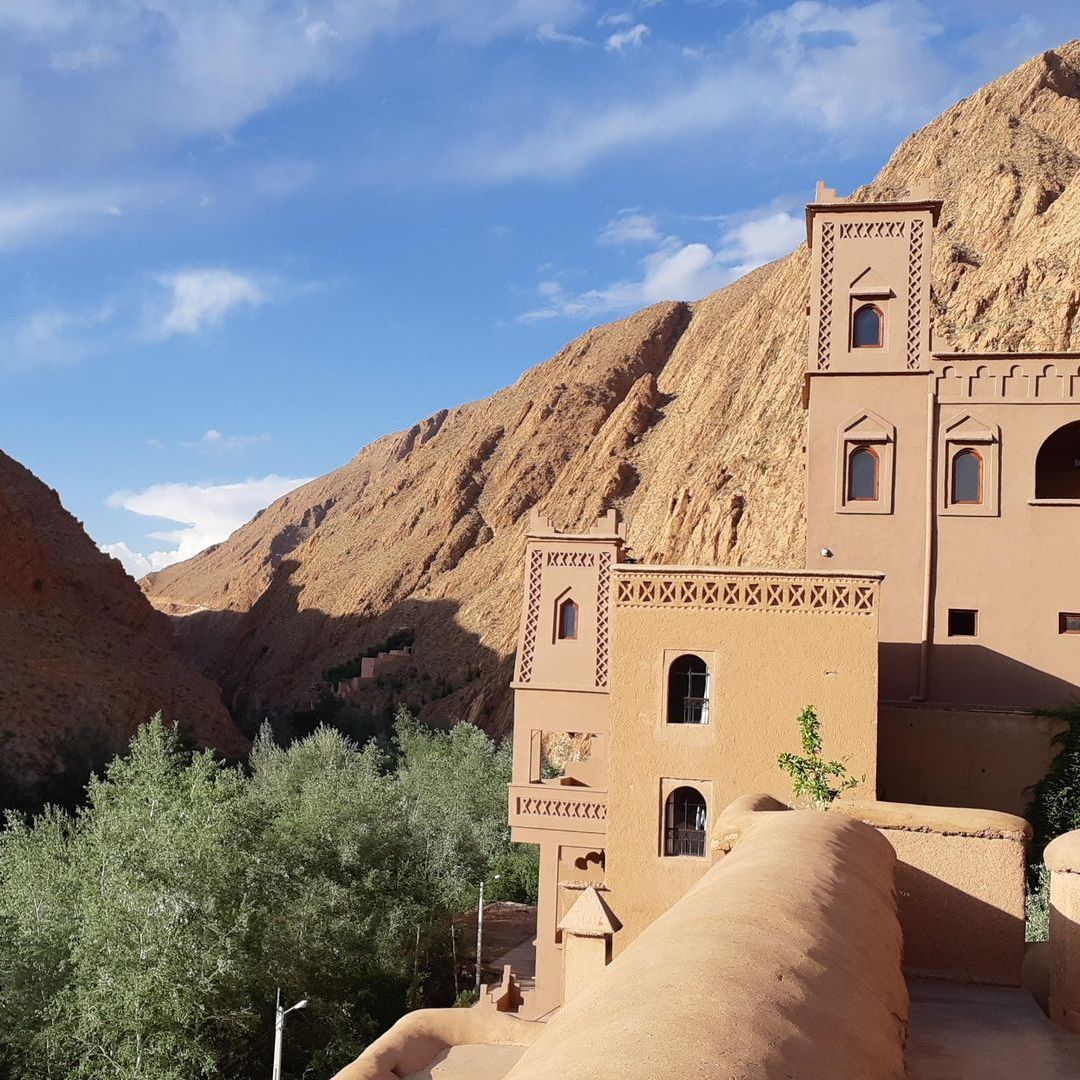
Etiquette
- Be sensitive of people's privacy taking photos
- Taking photos of people - how would you feel with a camera poked into your face?
- Perhaps say hello, ask for a selfie, show them and then ask for a photo of them - works a charm.
- Try and pick up a few curtesies in the language of the place you are visiting- it is always appreciated
Blog
We’ve travelled to Morocco many times over the years. You might enjoy some of our stories.
Workshops
Small sewing kit- needles are supplied in our workshops but your own might suit you better. Our hosts love to check out your sewing kit and anything you have made.
Art/sketch tours
A suggested art material list will be supplied for sketching tours.
Food
- Food is an integral part of culture and we are there to try it all. Generally, group meals we choose a range of dishes to share and look for local specialties as we go.
- Products like soy milk, manufactured substitute proteins, etc not seen.
- In Morocco they cook from scratch using fresh ingredients so keeping track of what goes into your dinner is easy enough.
- Vegetarian? Morocco- bit boring. You will have a lot of vegetables; you will need to bring a protein source with you. Nuts easily available in the bazaar.
- Vegetarianism is not a Moroccan concept, but hosts are happy to cater for you. In the bigger towns you will easily find vegatarian options.
- Vegan- Vegtable Tajines are vegan.
- Onion, garlic free- a challenge to manage
- Wheat Free- Morocco you need to bypass the breads, it is not used to thicken dishes.
- Dairy Free - easy enough to manage - dairy alternatives not commonly available.
- Breakfast is based on breads- you might like to bring an alternative.
Power Power – 240 volts, European adaptor plugs are the most useful.
Health
- Drink only filtered or bottled water- never local supply, even for cleaning your teeth
- Check yourself- Drink at least 2 litres of WATER per day. You will feel better for it and less likely to have a funny tummy.
- See your Doctor or a Travel Specialist Doctor before you leave home for travel advice
- Bring adequate medical supplies to cover your needs and the prescription to verify their use
- Menstrual needs- tampons not easy to find. Pads available
- Bug spray & sunscreen
Money
- Notify your bank you are going OS and to expect activity in which ever country, possibly transit lounges on the way, too. Otherwise they might flag unusual activity and block your card.
- Travel Cards can be good for security of your accounts CHECK before you leave that they actually work. A number of times guests have had issues.
- GOOD to have a backup card hidden in your suitcase, so that if primary card/s don’t work or get lost you have a fall-back card.
- ATM– easy to get cash
- Cash to exchange- good back up but not always easy to exchange at a good rate. Ask at hotel front desk.
- Credit Cards in the developing world few places have the facilities to process credit card transactions
- Credit Cards expect an additional fee to cover high processing fees of developing world banks. Not always but it happens
Currency - Moroccan Dirham
Shopping
- It happens, there are treasures to find 😊 It helps the local economy.
- If there are things you know you might want, for example carpets or spices do some research. How much would an item back home cost? It will give some starting point in your mind.
Bargaining is the general way to make a transaction. Not experienced? Google it and practice, generally most prices are negotiable in the marketplace. NGOs and Social enterprises are generally fixed price.
Suitcase
- Easier to start with a normal size suitcase and bring a soft bag to carry any extra stuff you acquire rather than a huge suitcase. Not easy to buy a second suitcase at the last minute on the road.
Recomended size suitcase
Medium Suitcase Typical Size: Between 60-70cm (H) x 40-50cm (W) x 25-30cm (D)
Translates to 24-28" (H) x 16-20" (W) x 10-12" (D).
Not easy to buy a second suitcase at the last minute on the road.
Weather
- At this time of year is warm in the daytime but perhaps evenings and mornings can be cool; a cardigan and socks appreciate
- Come prepared. In Morocco we have learnt the weather can be quiet different from year to year. Over the years we have had a snowstorm and cool weather throughout one trip and other years warm to very warm weather.
Clothing
- lightweight layers of clothing are good. Light, loose layers work well with the climate. Generally, I find 3 or 4 outfits sufficient, there is always the opportunity to pick up things along the way.
- Pack a pair of socks and cardigan for the cool of the morning.
- Bring a warm jacket.
- To respect local customs, it is best for skirts or trousers to be mid-calf length at least, tops not too revealing.
- A Scarf is handy to have. Good for bus if AC too cold, cover the head if needed.
- Leave your expensive jewellery at home
Shoes
- Sensible walking shoes such as sneakers or strapped on sandals are the best options. Surfaces are often rough, and you really want your footing stable so you can focus on all the wonderful things everywhere to look at!
Laundry - Any stop for 2 nights is a good time to send out laundry.
Fitness
- We get on and off the minibus every day, multiple times
- Bazaars, monuments and just about everywhere BEG to be explored.
- You need to be able to walk comfortably for an hour or two to explore. Expect some steps.
Begging? Begging is generally not to be encouraged. Giving gifts of pens and lollies to children is encouraging them to learn a begging mentality [if you like to give a gift to children, we can hand it onto a school].
There is no pension in Morocco – a few coins to a very old person or a handicapped person is very kind.
Tipping? It is the local custom so have a pocket full of small change to be ready.
If you receive a personal service – e.g. bags into or out of hotel, cup of tea through room service, laundry delivery, it is customary to give a tip . Suggest a few dirham
If you enjoy the commentary of a guide, a performance, take a photo of someone posing in the street etc it is customary to give them a tip.
- Set something aside for our driver – he will take us safely and comfortably through the adventure of many roads.
Think equivalent to a cup of coffee back home per day, per person.
Perhaps have a volunteer from the group organize a thank you at the end of the trip and give this tip directly to the driver.
Step lightly on our environment, be frugal in water use, turn off power switches, take rubbish with you where possible.
Say NO to Plastic!
Please bring a cloth carry bag.
Spain & Romania
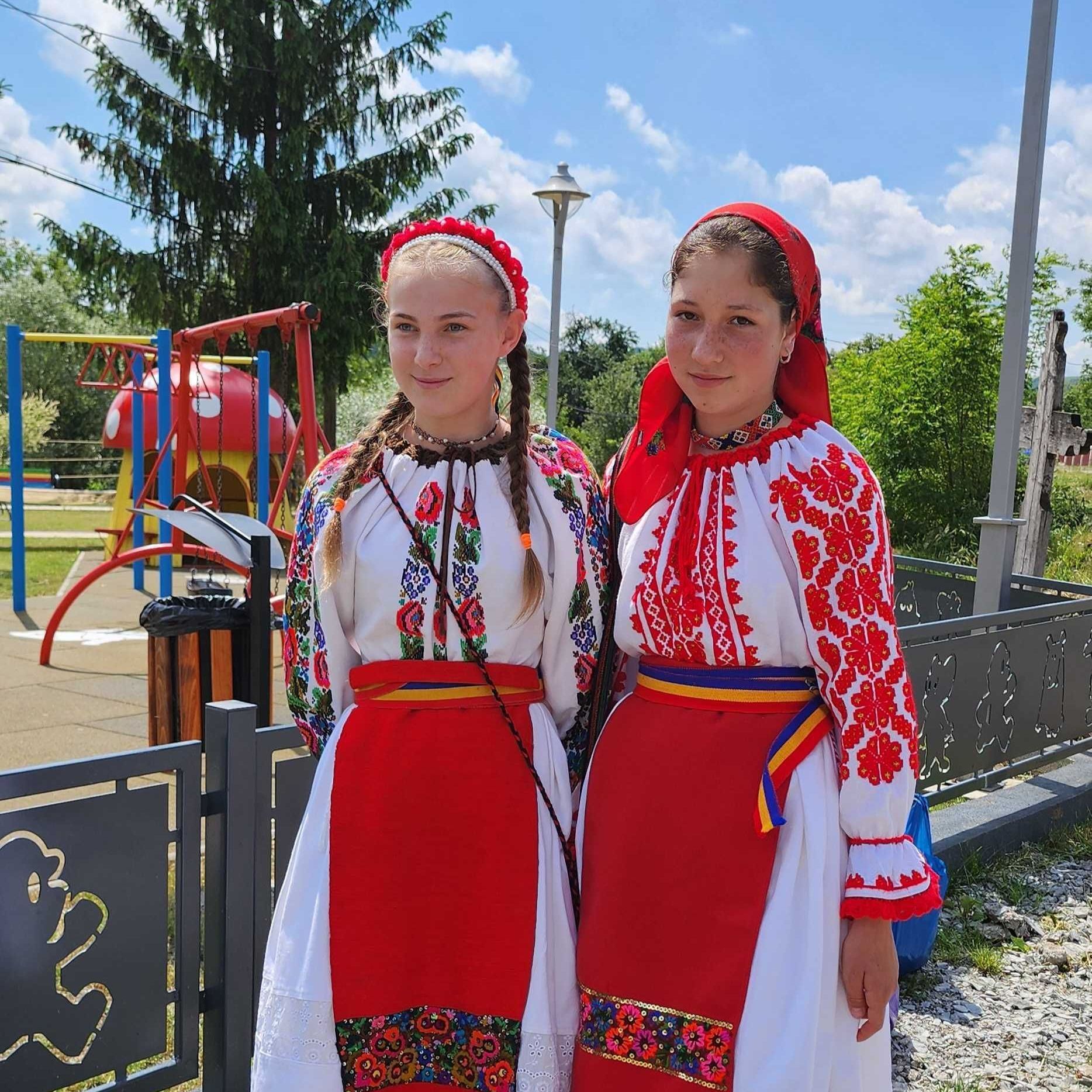
Etiquette
- Be sensitive of people's privacy taking photos in churches etc
- Taking photos of people - how would you feel with a camera poked into your face?
- Try and pick up a few curtesies in the language of the place you are visiting- it is always appreciated
Workshops
Small sewing kit- bring a small kit- needles and scissors. Our hosts love to check out your sewing kits and anything you made.
A suggested art materials list will be supplied for sketching tours.
Food Food is an integral part of culture and we are there to try it all. Generally, during group meals we choose a range of dishes to share and look for local specialties as we go.
In Romania they generally cook from scratch using fresh ingredients so keeping track of what goes into your dinner is easy enough.
Vegetarian? The Romanian Orthodox Church has lots of fasting days, which are vegetarian so there are often some options on menus
Vegan- little more challenging – they love butter and cheese
Health
- Check yourself- Drink at least 2 litres of WATER per day. You will feel better for it and less likely to have a funny tummy.
- See your Doctor or a Travel Specialist Doctor before you leave home for travel advice
- Bring adequate medical supplies to cover your needs and the prescription to verify their use
Money
- Notify your bank you are going OS and to expect activity in which ever country, possibly transit lounges on the way, too. Otherwise they might flag unusual activity and block your card.
- Travel Cards can be good for security of your accounts CHECK before you leave that they actually work. A number of times guests have had issues.
GOOD to have a backup card hidden in your suitcase, so that if primary card/s don’t work or get lost you have a fall-back card.
- ATM– easy to get cash
- Cash to exchange- good back up but not always easy to exchange at a good rate. Ask at hotel front desk.
- Credit Cards work fine. Credit Cards expect an additional fee to cover high processing fees of developing world banks. Not always but it happens
Shopping
- It happens, there are treasures to find 😊 It helps the local economy.
- If there are things you know you might want, for example carpets do some research. How much would an item back home cost? It will give some starting point in your mind.
Suitcase
- Easier to start with a normal size suitcase and bring a soft bag to carry any extra stuff you acquire rather than a huge suitcase. In Europe you need to manage your own luggage.
Weather
- At this time of year is warm in the daytime but perhaps evenings and mornings can be cool; a cardigan and socks appreciated
Power Power – 240 volts, you need European adaptor plugs.
Clothing
- Lightweight layers of clothing are good. Light, loose layers work well with the climate. Generally, I find 3 or 4 outfits sufficient, there is always the opportunity to pick up things along the way.
- Pack a pair of socks and cardigan for the cool of the morning.
- Leave your expensive jewellery at home
Shoes
- Sensible walking shoes such as sneakers or strapped on sandals are the best options. Surfaces are often rough, and you really want your footing stable so you can focus on all the wonderful things everywhere to look at!
Laundry
Any stop for 2 nights is a good time to send out laundry.
Fitness
We get on and off the minibus every day, multiple times
Bazaars, monuments and just about everywhere BEG to be explored. You need to be able to walk comfortably for an hour or two to explore. Expect some steps.
Begging? Begging is generally not to be encouraged. Giving gifts of pens and lollies to children is encouraging them to learn a begging mentality [if you like to give a gift to children, we can hand it onto a school].
Life is difficult – a few coins to a very old person or a handicapped person is very kind.
Tipping?
- If you enjoy the commentary of a guide, a performancer, take a photo of someone posing in the street etc it is customary to give them a tip
Set something aside for our driver – he will take us safely and comfortably through the adventure of many roads. Have someone from the group organize a thank you at the end of the trip and give this tip directly to the driver. Think about the equivalent of a cup of coffee back home/per person/per day.
Step lightly on our environment, be frugal in water use, turn off power switches, take rubbish with you where possible.
Say NO to Plastic!
Please bring a cloth carry bag
Sri Lanka
Etiquette
• Be sensitive of people's privacy taking photos in temples.
• Taking photos of people - how would you feel with a camera poked into your face? BUT people often love a good selfie- so say hello, ask for a selfie, show them and then ask for a photo of them - works a charm.
• Try and pick up a few courtesies in the language of the place you are visiting- it is always appreciated
Food
Food is an integral part of culture and we are there to try it all. Generally, with group meals we choose a range of dishes to share and look for local specialties as we go.
In Sri Lanka they cook from scratch using fresh ingredients so keeping track of what goes into your dinner is easy enough. Products like soy milk, manufactured substitute proteins, etc not seen.
Vegetarian? There are options but a bit limited.
Chilli free, a challenge, it is like saying don’t breathe to Indian cooks. We can definitely order mild, only a hint of spice.
Onion, garlic free- a challenge to manage
Wheat free- easy
Health
- Drink only filtered or bottled water- never local supply, even for cleaning your teeth
- Check yourself- Drink at least 2 litres of WATER per day. You will feel better for it and less likely to have a funny tummy.
See your Doctor or a Travel Specialist Doctor before you leave home for travel advice
Bring adequate medical supplies to cover your needs and the prescription to verify their use
Menstrual needs- tampons not easy to find. Pads available
Bug spray
Money
KNOW YOUR CARD PIN!!
ATMs everywhere. easy to withdraw funds. BUT you need to know your PIN. TAP might not be not allowed.
Notify your bank you are going OS and to expect activity in whichever country, possibly transit lounges on the way, too. Otherwise, they might flag unusual activity and block your card.
Travel Cards can be good for security of your accounts CHECK before you leave that they actually work. A number of times guests have had issues. www.wise.com cards seem to work well too- a few guests have had them recently.
GOOD to have a backup card hidden in your suitcase, so that if primary card/s don’t work or get lost you have a fall-back card.
ATM– easy to get cash
Cash to exchange- good back up but not always easy to exchange at a good rate. Ask at hotel front desk. Credit Cards in the developing world few places have the facilities to process credit card transactions
Credit Cards expect an additional fee to cover high processing fees of developing world banks. Not always but it happens
Currency – Sri Lankan Rupee
Shopping
It happens, there are treasures to find 😊 It helps the local economy.
If there are things you know you might want, for example spices do some research. How much would an item back home cost? It will give some starting point in your mind.
Bargaining is the general way to make a transaction. Not experienced? Google it and practice, generally most prices are negotiable in the marketplace. NGOs and Social enterprises are generally fixed price.
Suitcase Easier to start with a normal size suitcase and bring a soft bag to carry any extra stuff you acquire rather than a huge suitcase.
Weather At this time of year is warm in the daytime but perhaps evenings and mornings can be cool. Think layers so you can peel as the day warms up.
Power Power – 240 volts, British & European adaptor plugs are the most useful.- bring a Universal adaptor as it changes from place to place what will fit the socket.
Clothing Lightweight layers of clothing are good. Light, loose layers work well with the climate. Generally, I find 3 or 4 outfits enough, there is always the opportunity to pick up things along the way. Pack a pair of socks and cardigan for the cool of the morning.
To respect local customs, it is best for skirts or trousers to be mid-calf length at least, tops not revealing- cleavage no, mid-drift OK. Check out the older women in saris- a lot of belly, no problem.
A scarf is always good to have to hand. AC cool on bus, temple cover up….
ANY DAY we have a temple, mosque or other religious house mentioned, wear long trousers or skirt, and take a scarf to cover head if necessary. Often these places will lend you a cover up- think polyester sack, so better to be prepared and comfortable.
Leave your expensive jewellery at home
Suitcase
Easier to start with a normal size suitcase and bring a soft bag to carry any extra stuff you acquire rather than a huge suitcase - harder to fit on bus.
Recomended size suitcase
Medium Suitcase Typical Size: Between 60-70cm (H) x 40-50cm (W) x 25-30cm (D)
Translates to 24-28" (H) x 16-20" (W) x 10-12" (D).
Not easy to buy a second suitcase at the last minute on the road.
Shoes
Sensible walking shoes such as sneakers or strapped on sandals are the best options. Surfaces are often rough, and you really want your footing stable so you can focus on all the wonderful things everywhere to look at!
Pair of rubber thongs or flip-flops are good – often bathrooms can be slippery when wet.
Laundry Any stop for 2 nights is a good time to send out laundry. Sri Lankan laundry is a little luxury- it comes back, washed and ironed.
Fitness We get on and off the minibus every day, multiple times
Bazaars, monuments and just about everywhere BEG to be explored. You need to be able to walk comfortably for an hour or two to explore. Expect some steps.
Begging? Begging is generally not to be encouraged. Giving gifts of pens and lollies to children is encouraging them to learn a begging mentality [if you like to give a gift to children, we can hand it onto a school].
There is no pension in Sri Lanka – a few coins to a very old person or a handicapped person is very kind.
If you love the kids- take time to chat with them, rather than bringing little gifts. Gifts encourage a begging mentality- they don’t see you only what you have. A laugh and a joke- they see a nice person from far away talking to them.
Tipping? it is the local custom so have a pocket full of small change to be ready if you receive a personal service – e.g. bags into or out of hotel, cup of tea through room service, laundry delivery, it is customary to give a tip . Suggest 500 LKR ruppee
Set something aside for our driver –they will take us safely and comfortably through the adventure of many roads.
Think the equivalent of US$2 or 3 per person, per day [cost of a cup of coffee back home].
Perhaps have a volunteer from the group organize a thank you at the end of the trip and give this tip directly to the driver.
Step lightly on our environment, be frugal in water use, turn off power switches, take rubbish with you where possible.
Say NO to Plastic!
Please bring a cloth carry bag.
Türkiye
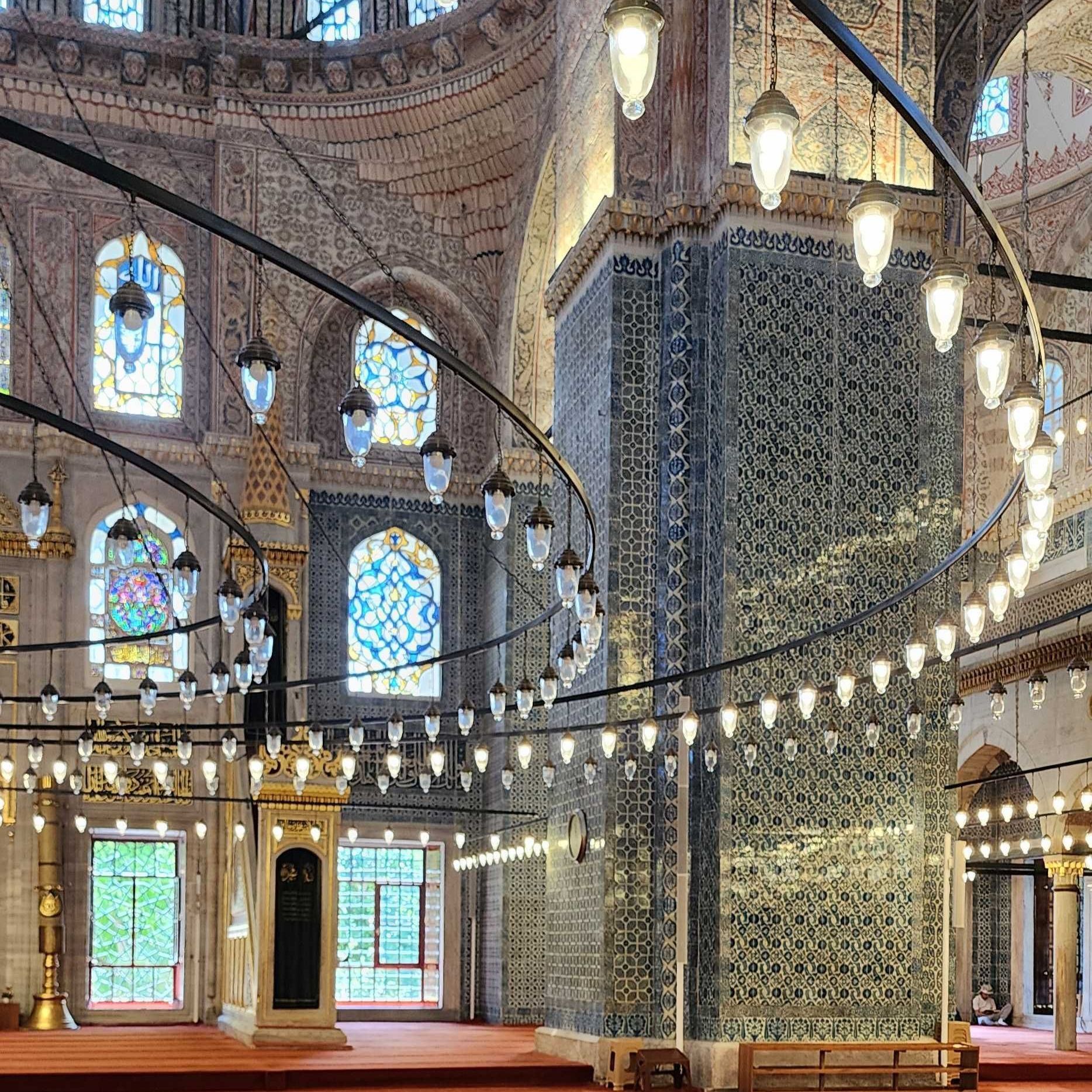
Etiquette
- Be sensitive of people's privacy taking photos
- Taking photos of people - how would you feel with a camera poked into your face?
- Perhaps say hello, ask for a selfie, show them and then ask for a photo of them - works a charm.
- Try and pick up a few curtesies in the language of the place you are visiting- it is always appreciated
Workshops Materials list will be supplied by tutor- see webpage
Food Food is an integral part of culture, and we are there to try it all. Generally, group meals, we choose a range of dishes to share and look for local specialties as we go.
In Türkiye they generally cook from scratch using fresh ingredients so keeping track of what goes into your dinner is easy enough.
Vegetarian? Türkiye – lots of vegetarian dishes in this meat loving country.
Vegan- little more challenging but possible
Onion, garlic free- a challenge to manage
Wheat free- Türkiye you need to bypass the breads and pastries, it is not used to thicken dishes.
Health
- Drink only filtered or bottled water- never local supply, even for cleaning your teeth THIS IS MY USEUAL ADVISE, But Istanbul boasts a good water supply and promotes using tap water not producing more plastic waste. Personally I was fine on tap water- you need to make the call of what is right for you.
- Check yourself- Drink at least 2 litres of WATER per day. You will feel better for it and less likely to have a funny tummy.
- See your Doctor or a Travel Specialist Doctor before you leave home for travel advice
- Bring adequate medical supplies to cover your needs and the prescription to verify their use
- Menstrual needs- tampons not easy to find. Pads available
Money
- Notify your bank you are going OS and to expect activity in which ever country, possibly transit lounges on the way, too. Otherwise they might flag unusual activity and block your card.
- Travel Cards can be good for security of your accounts CHECK before you leave that they actually work. A number of times guests have had issues.
- GOOD to have a backup card hidden in your suitcase, so that if primary card/s don’t work or get lost you have a fall-back card.
- ATM– easy to get cash
- Cash to exchange- good back up but not always easy to exchange at a good rate. Ask at hotel front desk.
- Credit Cards in the developing world few places have the facilities to process credit card transactions.
- Credit Cards expect an additional fee to cover high processing fees of developing world banks. Not always but it happens
Currency - Turkish Lira
Shopping
- It happens, there are treasures to find 😊 It helps the local economy.
- If there are things you know you might want, for example carpets or spices do some research. How much would an item back home cost? It will give some starting point in your mind.
Bargaining is the general way to make a transaction. Not experienced? Google it and practice, generally most prices are negotiable in the market place. NGOs and Social enterprises are generally fixed price.
Suitcase
- Easier to start with a normal size suitcase and bring a soft bag to carry any extra stuff you acquire rather than a huge suitcase.
Recomended size suitcase
Medium Suitcase Typical Size: Between 60-70cm (H) x 40-50cm (W) x 25-30cm (D)
Translates to 24-28" (H) x 16-20" (W) x 10-12" (D).
Not easy to buy a second suitcase at the last minute on the road.
Weather
- At this time of year is warm in the daytime but perhaps evenings and mornings can be cool; a cardigan and socks appreciated
Power – 240 volts, European adaptor plugs are the most useful.
Clothing Lightweight layers of clothing are good. Light, loose layers work well with the climate. Generally, I find 3 or 4 outfits sufficient, there is always the opportunity to pick up things along the way. Pack a pair of socks and cardigan for the cool of the morning.
To respect local customs, it is best for skirts or trousers to be mid-calf length at least, tops not too revealing. ANY DAY we have a mosque or other religious house mentioned, wear long trousers or skirt, and take a scarf to cover head if necessary. Often places will lend you a cover up- think polyester sack, so better to be prepared and comfortable.
Leave your expensive jewellery at home
Shoes Sensible walking shoes such as sneakers or strapped on sandals are the best options. Surfaces are often rough, and you really want your footing stable so you can focus on all the wonderful things everywhere to look at!
Fitness We get on and off the tram, bus, ferry, funicular railway multiple times each day
Bazaars, monuments and just about everywhere BEG to be explored. You need to be able to walk comfortably for an hour or two to explore. Expect some steps.
Begging? Begging is generally not to be encouraged. Giving gifts of pens and lollies to children is encouraging them to learn a begging mentality [if you like to give a gift to children, we can hand it onto a school].
There is little pension in Türkiye – a few coins to a very old person or a handicapped person is very kind.
Tipping? 10% in a restaurant if you enjoy the meal.
If you enjoy the commentary of a guide, a performance, take a photo of someone posing in the street etc it is customary to give them a 100 to 200 lira
Step lightly on our environment, be frugal in water use, turn off power switches, take rubbish with you where possible.
Say NO to Plastic!
Please bring a cloth carry bag.
Uzbekistan & Kyrgyzstan
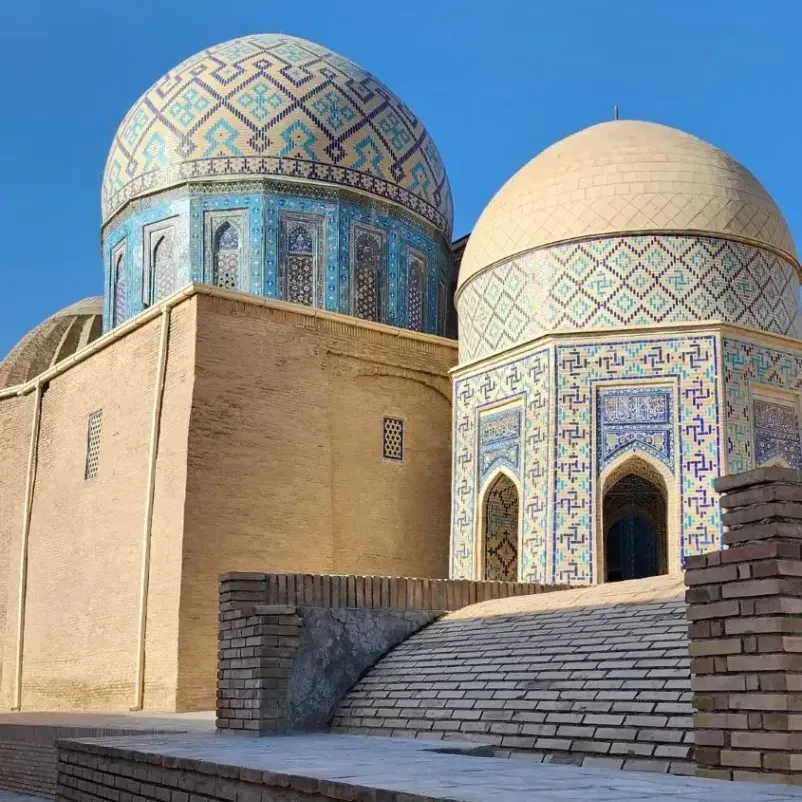
Etiquette
- Be sensitive of people's privacy taking photos
- Taking photos of people - how would you feel with a camera poked into your face? BUT people love a good selfie- so say hello, ask for a group selfie, show them and then ask for a photo of them - works a charm.
- Try and pick up a few curtesies in the language of the place you are visiting- it is always appreciated
Blog & Socials
Check my blog for impressions
Check out our Instagram and Facebook
Money
- Notify your bank you are going OS and to expect activity in whichever country, possibly transit lounges on the way, too. Otherwise, they might flag unusual activity and block your card.
- Travel Cards can be good for security of your accounts CHECK before you leave that they actually work. A number of times guests have had issues. WISE.com seem to be reliable.
- GOOD to have a backup card hidden in your suitcase, so that if primary card/s don’t work or get lost you have a fall-back card.
- ATM- easy way to get cash once you arrive. Easy to find everywhere in Uzbekistan.
- KNOW YOUR PIN NUMBERS– Tap does not work.
- Cash to exchange- good back up but not always easy to exchange at a good rate. Ask at hotel front desk. US$ easy, other currencies not.
- Credit Cards not readily accepted
- MAESRTO Cards and American Express NOT accepted
Currency - Uzbek Som
Workshops
- Workshops will be fully catered, we just need to turn up…. But, your own little kit with your needle and snips might be useful.
- Workshop hosts often enjoy seeing something you have made too, if you have something to show.
Art/ Sketch Tours
A suggested art material list will be supplied for sketching tours.
Food
Food is an integral part of culture and we are there to try it all. Generally, during group meals we choose a range of dishes to share and look for local specialties as we go.
- In Uzbekistan they cook from scratch using fresh ingredients so keeping track of what goes into your dinner is easy enough.
- Uzbekistan cuisine is rich and tasty. It is all based around various meat dishes.
- Vegetarian/Vegan options are very limited in big cities, on the road and in people homes really hard to find. There are lots of salads and bread, you might need to bring a protein source with you.
- Dried fruits and nuts are plentiful in the market
- Wheat/gluten issues, easy to avoid in big cities, on the road days there will be plov [meat and rice dish] or somsa [meat pastries]
- Dairy, easy enough to avoid.
Tipping?
- Tipping is not common or expected in Uzbekistan for bags, taxis etc. Restaurants 10% perhaps in fancy places.
- Set something aside for our driver – he will take us safely and comfortably through the adventure of many roads.
- Think equivalent to a cup of coffee back home per day, per person.
- Perhaps have a volunteer from the group organize a thank you at the end of the trip and give this tip directly to the driver.
- Optional but kind.
Health
- Drink only filtered or bottled water- never local supply, even for cleaning your teeth
- Check yourself- Drink at least 2 litres of WATER per day. You will feel better for it and less likely to have a funny tummy.
- See your Doctor or a Travel Specialist Doctor before you leave home for travel advice
- Bring adequate medical supplies to cover your needs and the prescription to verify their use
- Menstrual needs- tampons not easy to find. Pads available
Fitness
- We get on and off the minibus every day, multiple times
- Bazaars, monuments and just about everywhere BEG to be explored. You need to be able to walk comfortably for an hour or two to explore. Expect some steps.
What to Wear
- Keep a light scarf with you always, never know when you need to cover your head.
- Lightweight layers of clothing are good. Light, loose layers work well with the climate. Generally, I find 3 or 4 outfits sufficient, there is always the opportunity to pick up things along the way. Pack a pair of socks and cardigan for the cool of the morning.
- To respect local customs, it is best for skirts or trousers to be mid-calf length at least. Tops -shoulders and cleavage covered. Often places will lend or rent you a cover up- think polyester sack, so better to be prepared and comfortable. Carry a scarf with you.
- If you love 60’s black eyeliner and bold eyebrows- this is the place to indulge your fantasies, you’ll fit right in. Actually, the whole 60’s flowing maxi dress & black eyeliner look would fit right in.
- Leave your expensive jewellery at home
Shoes - Sensible walking shoes such as sneakers or strapped on sandals are the best options. Surfaces are often rough, and you really want your footing stable so you can focus on all the wonderful things everywhere to look at!
Suitcase
Easier to start with a normal size suitcase and bring a soft bag to carry any extra stuff you acquire rather than a huge suitcase - harder to fit on bus.
Recomended size suitcase
Medium Suitcase Typical Size: Between 60-70cm (H) x 40-50cm (W) x 25-30cm (D)
Translates to 24-28" (H) x 16-20" (W) x 10-12" (D).
Not easy to buy a second suitcase at the last minute on the road.
Laundry
Any stop for 2 nights is a good time to send out laundry.
Shopping
- It happens, there are treasures to find 😊 It helps the local economy.
- If there are things you know you might want, for example carpets or spices do some research. How much would an item back home cost? It will give some starting point in your mind.
Bargaining is the general way to make a transaction. Not experienced? Google it and practice, generally most prices are negotiable in the marketplace. NGOs and Social enterprises are generally fixed price.
Suitcase
Easier to start with a normal size suitcase and bring a soft bag to carry any extra stuff you acquire rather than a huge suitcase - harder to fit on bus.
Recomended size suitcase 29-31 in / 75-79 cm.
Not easy to buy a second suitcase at the last minute on the road.
Weather
- At this time of year, it is warm in the daytime but perhaps evenings and mornings can be cool; a cardigan and socks appreciated.
- Usually dry weather, bring moisturizing cream.
- Sunny usually, maybe a sunhat?
Power 240 volts, European adaptor plugs are the most useful.
Begging? Rarely seen. Don’t give kids little treats, it encourages them to a begging mentality, rather take time to have a little chat- it encourages friendly attitude.
Step lightly on our environment, be frugal in water use, turn off power switches, take rubbish with you where possible.
Say NO to Plastic!
Please bring a cloth carry bag.
Vietnam, Thailand & Laos
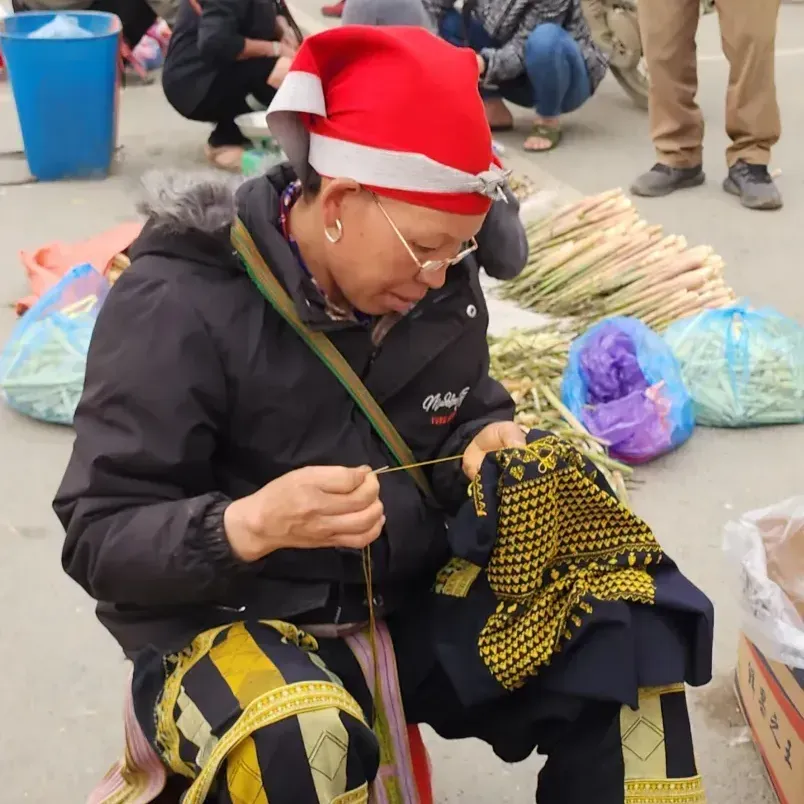
Etiquette
- Be sensitive of people's privacy taking photos
- Taking photos of people - how would you feel with a camera poked into your face? BUT people love a good selfie- so say hello, ask for a group selfie, show them and then ask for a photo of them - works a charm.
- Try and pick up a few curtesies in the language of the place you are visiting- it is always appreciated
Blog
We have been visiting Vietnam since 2007, take a look back through our blog for stories and observations. Here is a list of entries labelled Vietnam.
Workshops
For stitch people-
Sewing kit- needles etc supplied in our workshops but your own needles might be easier on your hands. Our hosts love to check out sewing kits and anything you might have made. Embroideries will catch their eye.
Art/Journal/Sketch people-
your tutor will supply a list of suggestions for a travelling art kit in the preparations for the journey
Food - flavours and syle a little different but similar ingredients
- Food is an integral part of culture and we are there to try it all. Generally, during group meals we choose a range of dishes to share and look for local specialties as we go.
- Vietnam cooks from scratch using fresh ingredients so keeping track of what goes into your dinner is easy enough.
- Vegetarian? A lot of tofu in Vietnam, they use fish sauce often, difficult to bypass it.
- Laos- not as much tofu , just a lot of vegetables - fish sauce is often in there.
- Vegan- see above
- Onion, garlic free- a challenge to manage
- Wheat &/or dairy free- manageable in Vietnam.
Health
- Drink only filtered or bottled water- never local supply, even for cleaning your teeth
- Check yourself- Drink at least 2 litres of WATER per day. You will feel better for it and less likely to have a funny tummy.
- See your Doctor or a Travel Specialist Doctor before you leave home for travel advice
- Bring adequate medical supplies to cover your needs and the prescription to verify their use
- Menstrual needs- tampons not easy to find. Pads available
- Bug spray
Money
- Notify your bank you are going OS and to expect activity in which ever country, possibly transit lounges on the way, too. Otherwise they might flag unusual activity and block your card.
- Travel Cards can be good for security of your accounts CHECK before you leave that they actually work. A number of times guests have had issues.
- GOOD to have a backup card hidden in your suitcase, so that if primary card/s don’t work or get lost you have a fall-back card.
- ATM– easy to get cash
- Cash to exchange- good back up but not always easy to exchange at a good rate. Ask at hotel front desk.
- Credit Cards in the developing world few places have the facilities to process credit card transactions
- Credit Cards expect an additional fee to cover high processing fees of developing world banks. Not always but it happens
- KNOW YOUR CARD PIN - Tap does not work
Currency - Vietnam Dong
- Laotian Kip
- Thai Baht
Shopping It happens, there are treasures to find 😊 It helps the local economy.
Bargaining is the general way to make a transaction. Not experienced? Google it and practice, generally most prices are negotiable in the marketplace. NGOs and Social enterprises are generally fixed price.
Suitcase
Easier to start with a normal size suitcase and bring a soft bag to carry any extra stuff you acquire rather than a huge suitcase - harder to fit on bus.
Recomended size suitcase
Medium Suitcase Typical Size: Between 60-70cm (H) x 40-50cm (W) x 25-30cm (D)
Translates to 24-28" (H) x 16-20" (W) x 10-12" (D).
Not easy to buy a second suitcase at the last minute on the road.
Weather
- At this time of year it is warm in the daytime but perhaps evenings and mornings can be cool; a cardigan and socks appreciated.
- Can be a bit of rain about, bring an umbrella or showerproof jacket.
- Laos - you will need a warm jacket for early morning on the boat - days will then be nice and warm.
Power – 240 volts, European adaptor plugs are the most useful.
Clothing
- Lightweight layers of clothing are good. Light, loose layers work well with the climate.
- Generally, I find 3 or 4 outfits sufficient, there is always the opportunity to pick up things along the way.
- Pack a pair of socks and cardigan for the cool of the morning.
- To respect local customs, it is best for skirts or trousers to be mid-calf length at least, tops not too revealing.
- Leave your expensive jewellery at home
Shoes Sensible walking shoes such as sneakers or strapped on sandals are the best options. Surfaces are often rough, and you really want your footing stable so you can focus on all the wonderful things everywhere to look at!
Laundry
Any stop for 2 nights is a good time to send out laundry.
Fitness
- We get on and off the minibus every day, multiple times each day
- Markets, monuments and just about everywhere BEG to be explored. You need to be able to walk comfortably for an hour or two to explore.
- Expect some steps.
Begging? Begging is generally not to be encouraged. Giving gifts of pens and lollies to children is encouraging them to learn a begging mentality [if you like to give a gift to children, we can hand it onto a school].
There is no pension in Vietnam – a few coins to a very old person or a handicapped person is very kind.
Tipping?
- It is the local custom so have a pocket full of small change to be ready If you receive a personal service – e.g. bags into or out of hotel, cup of tea through room service, laundry delivery, it is customary to give a tip .
- If you enjoy the commentary of a guide, a performance, take a photo of someone posing in the street etc it is customary to give them a tip
- Set something aside for our translator and our driver – they will take us safely and comfortably through the adventure of many roads.Think equivalent to a cup of coffee back home per day, per person.
- Perhaps have a volunteer from the group organize a thank you at the end of the trip and give this tip directly to the driver.
Step lightly on our environment, be frugal in water use, turn off power switches, take rubbish with you where possible.
Say NO to Plastic!
Please bring a cloth carry bag.
West Africa
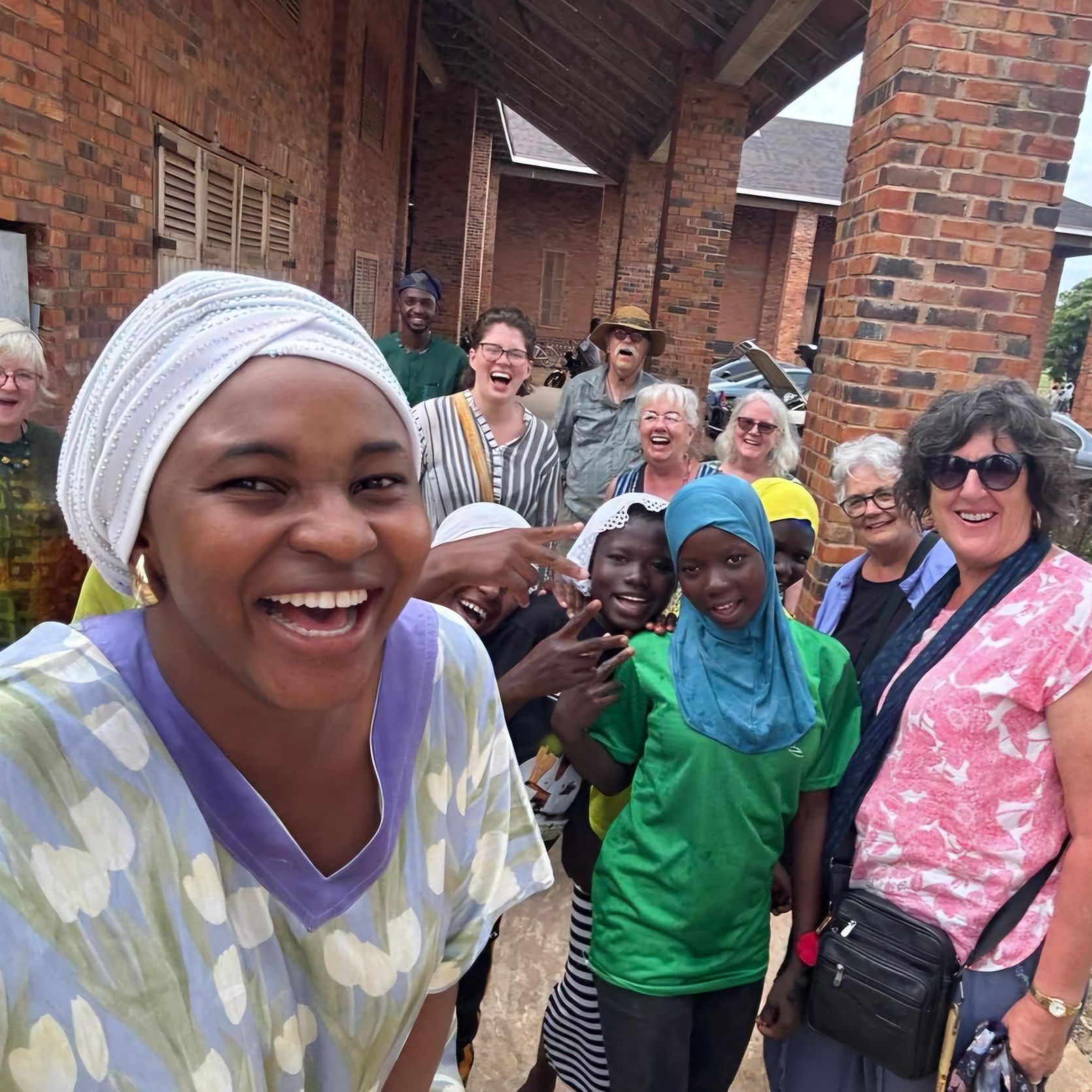
Etiquette
- You will find West Africa friendly and welcomeing BUT people do not like their photo taken and you will be told VERY LOUDLY to stop
- DO NOT TAKE PHOTOS OF PEOPLE WITHOUT PERMISSION.
- Taking photos of people - how would you feel with a camera poked into your face? BUT people love a good selfie- so say hello, ask for a group selfie, show them and then ask for a photo of them - works a charm.
- Try and pick up a few curtesies in the language of the place you are visiting- it is always appreciated
NOTE: Yellow Fever Vaccination mandatory- make sure you carry the certificate with you.
Or a Doctor’s Certificate for Vaccination Exemption.
Blog The first time we visited Ghana was in 2010 and we really enjoyed our trip, we have been taking guests with us ever since. My blog has stories and impressions you might enjoy.
Workshops
- Our hosts love to check out anything you made so bring a little show and tell.
- Apron for batik day?
Food
- Food is an integral part of culture and we are there to try it all. Generally, at group meals we choose a range of dishes to share and look for local specialties as we go.
- In Ghana they cook from scratch using fresh ingredients so keeping track of what goes into your dinner is easy enough.
- Vegetarian? In Ghana, there is ONLY red,red beans, various rice dishes and starches.
- Usually the protein is separate dish that goes with the carbohydrate.
- Easy enough to sort out but we hope you like red,red beans.
- Vegan- little more challenging but possible, dairy is not a big thing in Ghana.
- Onion, garlic free- a challenge to manage.
- Wheat free- easy.
Health
- Yellow Fever inoculation MANDATORY for West Africa and Ghana
- Drink only filtered or bottled water- never local supply, even for cleaning your teeth
- Check yourself- Drink at least 2 litres of WATER per day. You will feel better for it and less likely to have a funny tummy.
- See your Doctor or a Travel Specialist Doctor before you leave home for travel advice
- Bring adequate medical supplies to cover your needs and the prescription to verify their use
- Menstrual needs- tampons not easy to find. Pads available
- Bug spray
Money
- Notify your bank you are going OS and to expect activity in which ever country, possibly transit lounges on the way, too. Otherwise they might flag unusual activity and block your card.
- Travel Cards can be good for security of your accounts CHECK before you leave that they actually work. A number of times guests have had issues.
- GOOD to have a backup card hidden in your suitcase, so that if primary card/s don’t work or get lost you have a fall-back card.
- ATM– easy to get cash West Africa
- Cash to exchange- good back up but not always easy to exchange at a good rate. Ask at hotel front desk.
- Credit Cards in the developing world few places have the facilities to process credit card transactions
- Credit Cards expect an additional fee to cover high processing fees of developing world banks. Not always but it happens
Currency - Ghana Cedi
- Benin & Togo - West African
CFA FrancShopping It happens, there are treasures to find 😊 It helps the local economy.
Bargaining is the general way to make a transaction. Not experienced? Google it and practice, generally most prices are negotiable in the marketplace. NGOs and Social enterprises are generally fixed price.
Suitcase
Easier to start with a normal size suitcase and bring a soft bag to carry any extra stuff you acquire rather than a huge suitcase.
Weather
- At this time of year is warm to very warm in the daytime.
- Expect the odd shower, bring an umbrella. It is still warm and the shower clears the air.
Power Power –
Ghana - 240 volts, English style plug
Benin & Togo - 240 volt, European plugs
UNIVERSAL plug adaptor most useful
Clothing
- Lightweight layers of clothing are good. Light, loose layers work well with the climate. Generally, I find 3 or 4 outfits sufficient, there is always the opportunity to pick up things along the way.
- To respect local customs, it is best for skirts or trousers to be mid-calf length at least, tops not too revealing.
- Leave your expensive jewellery at home
Shoes Sensible walking shoes such as sneakers or strapped on sandals are the best options. Surfaces are often rough, and you really want your footing stable so you can focus on all the wonderful things everywhere to look at!
- Suitcase
Easier to start with a normal size suitcase and bring a soft bag to carry any extra stuff you acquire rather than a huge suitcase - harder to fit on bus.
Recomended size suitcase
Medium Suitcase Typical Size: Between 60-70cm (H) x 40-50cm (W) x 25-30cm (D)
Translates to 24-28" (H) x 16-20" (W) x 10-12" (D).
Not easy to buy a second suitcase at the last minute on the road.
- Laundry - Any stop for 2 nights is a good time to send out laundry.
Fitness
- We get on and off the minibus every day, multiple times
- Markets, monuments and just about everywhere BEG to be explored. You need to be able to walk comfortably for an hour or two to explore. Expect some steps.
Begging? Begging is generally not to be encouraged. Giving gifts of pens and lollies to children is encouraging them to learn a begging mentality [if you like to give a gift to children, we can hand it onto a school]. Talk to kids, it creates a good impression and connection.
- There is no pension in India/Morocco/Ghana/Vietnam – a few coins to a very old person or a handicapped person is very kind.
Tipping?
- it is the local custom so have a pocket full of small change to be ready If you receive a personal service – e.g. bags into or out of hotel, cup of tea through room service, laundry delivery, it is customary to give a tip .
- Set something aside for our translator and our driver –they will take us safely and comfortably through the adventure of many roads.
- Think the equivalent of US$2 or 3 per person, per day [cost of a cup of coffee back home].
- Perhaps have a volunteer from the group organize a thank you at the end of the trip and give this tip directly to the driver.
Step lightly on our environment, be frugal in water use, turn off power switches, take rubbish with you where possible.
Say NO to Plastic! Please bring a cloth carry bag.

